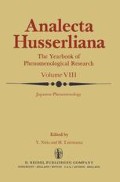Abstract
In our ordinary language, there are two ways of speaking of time. We say in some cases that each position in time is “earlier” than some positions and “later” than others, and in other cases that each position is either “past,” “present,” or “future.” In the article entitled “The Unreality of Time” in Mind (1908), J. E. McTaggart distinguished these two ways, and for the sake of brevity spoke of the series of positions running from the past through the present to the future as the A series, and the series of positions which runs from earlier to later as the B series. And, regarding the A series as more fundamental to time than the B series, he asserted that time is unreal. For, according to him, the A series is not a series of the real. This view is also put forward in his posthumous Nature of Existence, II (1927). On the contrary, P. Bieri, regarding the B series as the more fundamental, asserts in his recent book Zeit and Zeiterfahrung (1972) that time is real. In his opinion, the A series involves the B series as its “principle of construction.” But I think that these two arguments are not quite contrary, because the B series should also be considered unreal. I will state my reasons in this paper. As for myself, I believe that it is only motion or change of things that is real, and it may be possible to draw this conclusion mutatis mutandis from Husserl’s theory of the constitution of time.
Access this chapter
Tax calculation will be finalised at checkout
Purchases are for personal use only
Preview
Unable to display preview. Download preview PDF.
Notes
B. Russell, The Principles of Mathematics, I,Cambridge, 1903, § 442.
J. M. E. McTaggart, Nature of Existence, II,Cambridge, 1968, § 315.
J. E. McTaggart, ‘The Unreality of Time,’ Mind, 1908.
A. Lalande, Vocabulaire technique et critique de la philosophie, P.U.F., 1956.
A. Koyré. Newtonian Studies, Chapman & Hall, 1965, p. 103.
E. Husserl, The Phenomenology of Internal Time-Consciousness,translated by J. Churchill, M. Nijhoff, 1964, §39.
P. Bieri, Zeit und Zeiterfahrung, Suhrkamp Verlag, 1972, p. 199.
G. Berger, Phénoménologie du temps et prospective, P.U.F., 1964, p. 130.
Cf. ‘L’épaisseur du présent préobjectif,’ M. Merleau-Ponty, Phénoménologie de la perception, Gallimard, 1945, p. 495.
K. Held, Lebendige Gegenwart, Nijhoff, 1966.
Author information
Authors and Affiliations
Editor information
Editors and Affiliations
Rights and permissions
Copyright information
© 1979 D. Reidel Publishing Company, Dordrecht, Holland
About this chapter
Cite this chapter
Takiura, S. (1979). Is Time Real?. In: Nitta, Y., Tatematsu, H. (eds) Japanese Phenomenology. Analecta Husserliana, vol 8. Springer, Dordrecht. https://doi.org/10.1007/978-94-009-9868-1_6
Download citation
DOI: https://doi.org/10.1007/978-94-009-9868-1_6
Publisher Name: Springer, Dordrecht
Print ISBN: 978-94-009-9870-4
Online ISBN: 978-94-009-9868-1
eBook Packages: Springer Book Archive

